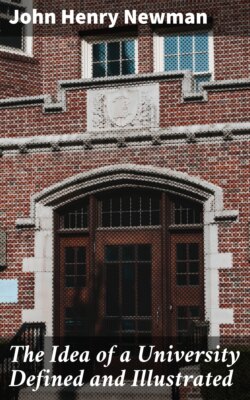Читать книгу The Idea of a University Defined and Illustrated - John Henry Newman - Страница 18
На сайте Литреса книга снята с продажи.
4.
ОглавлениеTable of Contents
This, I fear, is the conclusion to which intellects, clear, logical, and consistent, have come, or are coming, from the nature of the case; and, alas! in addition to this primâ-facie suspicion, there are actual tendencies in the same direction in Protestantism, viewed whether in its original idea, or again in the so-called Evangelical movement in these islands during the last century. The religious world, as it is styled, holds, generally speaking, that Religion consists, not in knowledge, but in feeling or sentiment. The old Catholic notion, which still lingers in the [pg 028] Established Church, was, that Faith was an intellectual act, its object truth, and its result knowledge. Thus if you look into the Anglican Prayer Book, you will find definite credenda, as well as definite agenda; but in proportion as the Lutheran leaven spread, it became fashionable to say that Faith was, not an acceptance of revealed doctrine, not an act of the intellect, but a feeling, an emotion, an affection, an appetency; and, as this view of Faith obtained, so was the connexion of Faith with Truth and Knowledge more and more either forgotten or denied. At length the identity of this (so-called) spirituality of heart and the virtue of Faith was acknowledged on all hands. Some men indeed disapproved the pietism in question, others admired it; but whether they admired or disapproved, both the one party and the other found themselves in agreement on the main point, viz.—in considering that this really was in substance Religion, and nothing else; that Religion was based, not on argument, but on taste and sentiment, that nothing was objective, every thing subjective, in doctrine. I say, even those who saw through the affectation in which the religious school of which I am speaking clad itself, still came to think that Religion, as such, consisted in something short of intellectual exercises, viz., in the affections, in the imagination, in inward persuasions and consolations, in pleasurable sensations, sudden changes, and sublime fancies. They learned to believe and to take it for granted, that Religion was nothing beyond a supply of the wants of human nature, not an external fact and a work of God. There was, it appeared, a demand for Religion, and therefore there was a supply; human nature could not do without Religion, any more than it could do without bread; a supply was absolutely necessary, good or bad, and, as in the case of the articles [pg 029] of daily sustenance, an article which was really inferior was better than none at all. Thus Religion was useful, venerable, beautiful, the sanction of order, the stay of government, the curb of self-will and self-indulgence, which the laws cannot reach: but, after all, on what was it based? Why, that was a question delicate to ask, and imprudent to answer; but, if the truth must be spoken, however reluctantly, the long and the short of the matter was this, that Religion was based on custom, on prejudice, on law, on education, on habit, on loyalty, on feudalism, on enlightened expedience, on many, many things, but not at all on reason; reason was neither its warrant, nor its instrument, and science had as little connexion with it as with the fashions of the season, or the state of the weather.
You see, Gentlemen, how a theory or philosophy, which began with the religious changes of the sixteenth century, has led to conclusions, which the authors of those changes would be the first to denounce, and has been taken up by that large and influential body which goes by the name of Liberal or Latitudinarian; and how, where it prevails, it is as unreasonable of course to demand for Religion a chair in a University, as to demand one for fine feeling, sense of honour, patriotism, gratitude, maternal affection, or good companionship, proposals which would be simply unmeaning.
